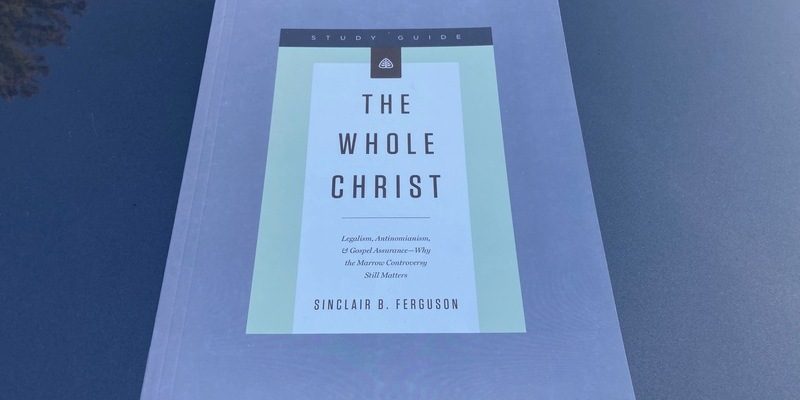Lord’s Library editors compiled this brief that offers a short summary of The Whole Christ, a notable title by Sinclair B. Ferguson.
Sinclair B. Ferguson’s book The Whole Christ focuses primarily on the theological debates surrounding antinomianism and legalism, providing a thorough examination of these concepts and their implications for believers. Antinomianism and legalism are scrutinized in favor of a balanced understanding of grace and obedience. It’s a recommended read by our editors.
He argues that this perspective distorts the true nature of God’s grace and diminishes the importance of holy living and obedience to God’s commands. He contends that legalism is equally damaging to genuine faith, as it diminishes the centrality of God’s grace and fosters a self-righteous and works-based approach to salvation.
Ferguson presents a compelling argument for the necessity of upholding the moral law as an expression of gratitude for God’s grace, rather than a means of earning salvation. This perspective aligns with the fundamental Christian belief that salvation is a gift of God’s grace through faith in the Gospel of Jesus Christ.
Note: Ligonier Ministries also offers a dedicated, companion study guide to this popular Christian book.
The Whole Christ Summary
The Whole Christ Summary: Points to Know Before Reading
The Whole Christ Explores the Marrow Controversy
The Marrow Controversy took place within Scottish Presbyterianism in the first half of the 18th century, surrounding buzz about the book The Marrow of Modern Divinity by Edward Fisher. The book emphasizes the concepts of God’s grace, the free offer of the Gospel, and the assurance of salvation.
Opponents of the Marrow theology raised concerns about antinomianism. It reached a climax in 1720 when the General Assembly of the Church of Scotland addressed the theological issues and condemned certain aspects of the theology, which led to further debate.
And the Pitfalls of Legalism & Antinomianism
Legalism is the theological perspective that places an excessive emphasis on the law, and ultimately human works as the means of achieving salvation. Antinomianism, on the other hand, is the belief that the moral law has no place in the life of a believer. Antinomians may downplay or disregard the importance of living in accordance with God’s moral standards, arguing that grace alone is sufficient.
While Referencing the Westminster Confession of Faith
Ferguson references the Westminster Confession of Faith and its teachings on topics such as justification, sanctification, and the law. The Westminster Confession addresses the topics of legalism and antinomianism, providing a theological framework for understanding the proper relationship between God’s Grace and the believer’s obedience to His moral law.
The book not only addresses theological concepts but also provides pastoral guidance and encouragement for believers navigating questions of grace, the law, and the Christian life. Some familiarity with the Westminster Confession can aid in comprehending the theological discussions in the book.
And Drawing on Writings from Theologians Like John Owen
The theological debates covered in this work are informed by Owen’s theological contributions, particularly regarding the nature and extent of Christ’s atonement. His works, including The Death of Death in the Death of Christ and Communion with God, have had a profound impact on Reformed theology.
The Whole Christ draws on Owen’s insights to discuss how believers can find assurance and security in Christ.
To Deliver Practical Implications for the Christian Life
One of the central practical implications of this work is the assurance of salvation. Ferguson emphasizes that true assurance is found in Christ alone, not in our own obedience. Understanding that our acceptance by God is based on grace liberates believers from the burden of trying to earn their salvation.
Practical holiness is not a means to earn salvation but a way to express gratitude for what Jesus Christ already did! While the law cannot save, it serves as a guide for Christian living. The book’s pastoral approach guides church leaders in shepherding their congregations as well.
Lord's Library is a Christian resource hub. Our editors use a variety of internet research methods like search engines, audio and video, AI, consultations with ministry leaders in the field, and more. Lord's Library should never be a substitute for reading your Bible daily as the Scriptures are to be our final authority on all matters. Lord's Library participates in affiliate programs. We may make a small commission from products purchased through this resource.
- What Does the Bible Say About Achievements? With Key Scriptures - April 11, 2025
- What does the Bible Say About Abortion? With Key Scriptures - April 11, 2025
- Prosperity Gospel Meaning in the Scriptures: Is it Biblical? - April 7, 2025














